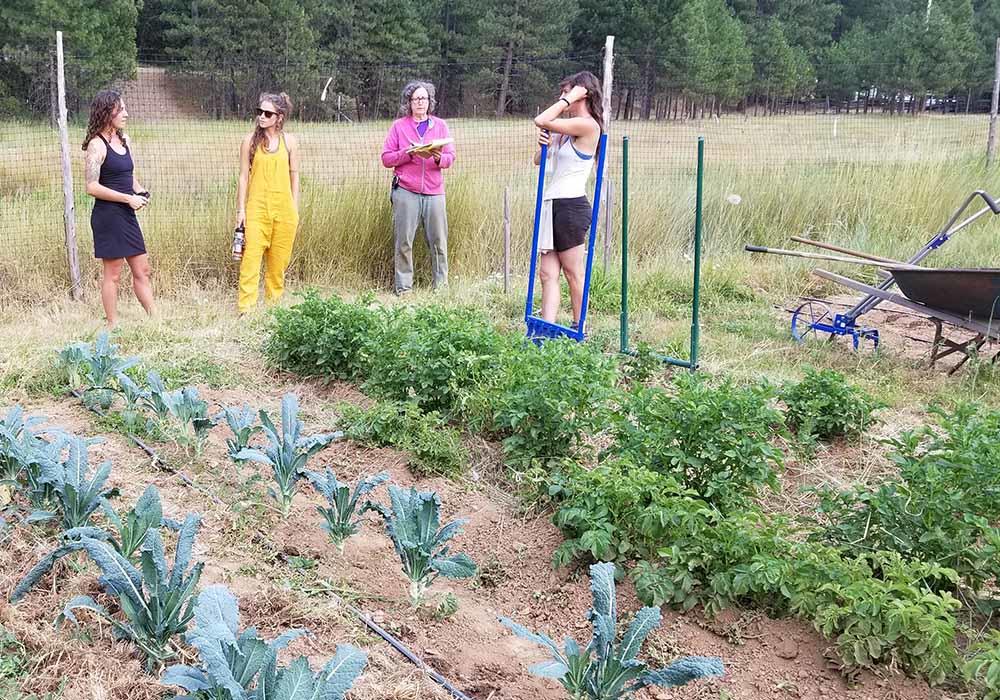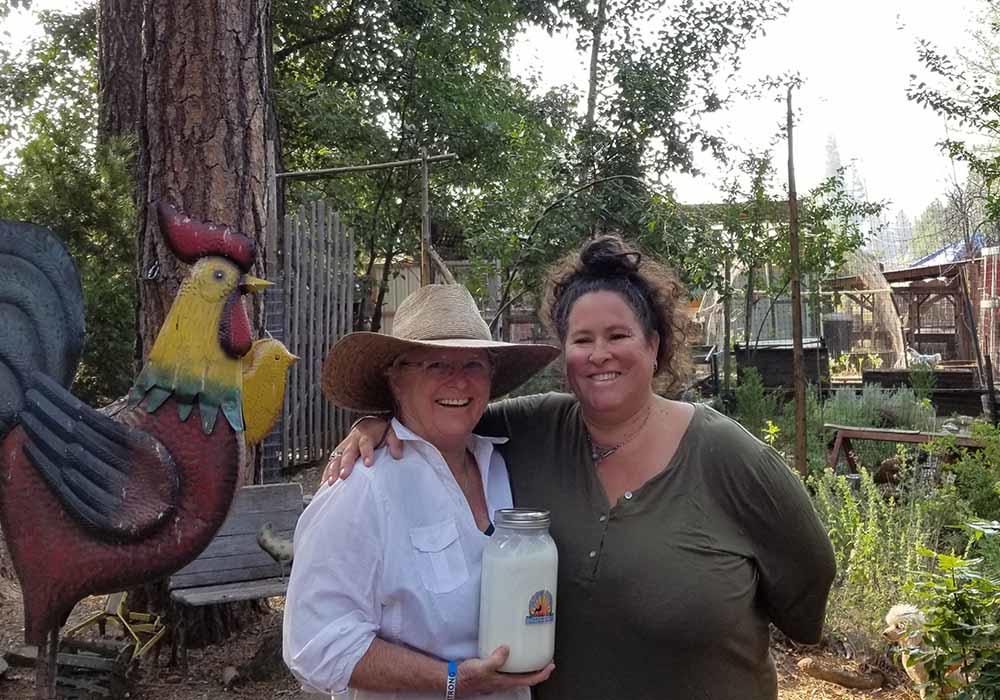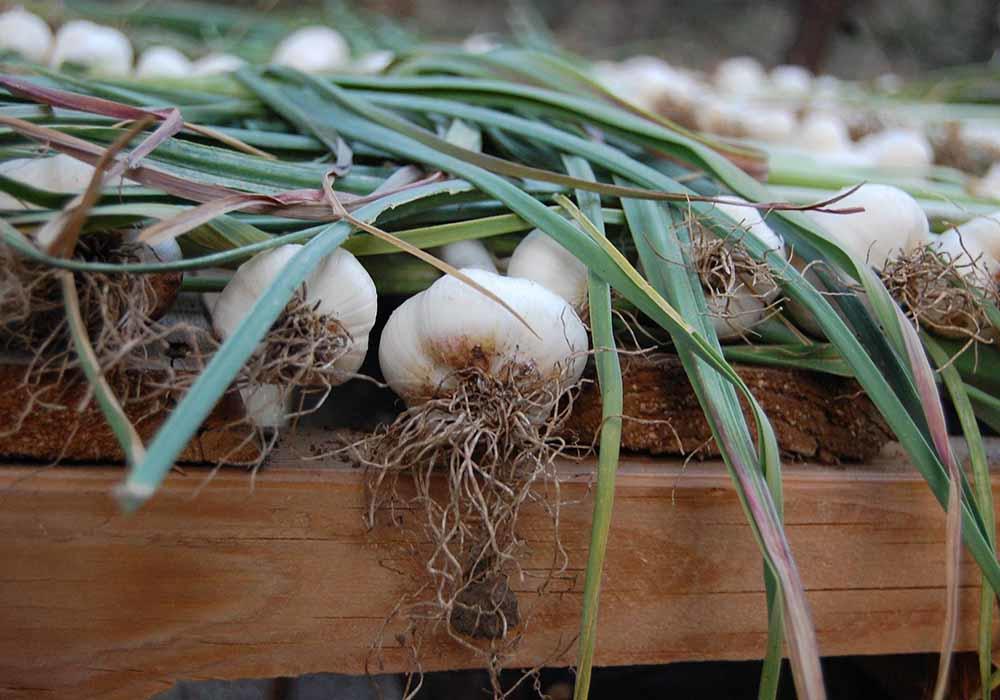
Eco Farming Certificate
Whether you’re looking to turn farming into a full-time profession or simply scale up your home garden, our eco-farming certificate is designed to meet your goals. During the year-long certificate, you’ll learn to start and efficiently operate your own farm, manage existing farms, or work for organizations promoting farm and food education and production.
"The Eco-Farm Certificate has helped me understand how everyone can contribute to biodiversity by growing nourishing edibles."
Certificate Requirements & Overview
Complete required core courses and select 4 - 5 units from the remaining list of electives.
AGPS/ENVR 210 Introduction to Soil Science (3 Units)
ENVR 130 Introduction to Sustainable Food Systems (2 Units)
ENVR 131 High Altitude Crop Production - Fall (2 Units)
ENVR 132 High Altitude Crop Production - Spring (2 Units)
ENVR 133 Ecological Pest Management (1 Unit)
AGMA 160 Introduction to Mechanized Agriculture (3 Units)
BUS 116 Human Relations in Business (3 Units)
BUS 130 Small Business Management (3 Units)
BUS 171 Project-Based Learning (1-3 Units)
ENVR 134 Season Extension Structures (1 Unit)
ENVR 135 Small Farm Tools and Infrastructure (1 Unit)
Total Certificate Requirements....................................................................................................... 14-15
We designed our curriculum with local farmers to create the optimal combination of classroom activities and practical, hands-on learning opportunities in a supportive environment. Over the course of a year, we’ll focus on:
- Ecological production methods
- Techniques for high-altitude, diversified crop production and season extension
- Marketing and business management skills
- Small farms as a tool for positive social, economic and environmental change
By the end of the certificate, you’ll have the skills to confidently operate a sustainable, small-scale farm and pursue careers in agriculture and food systems.
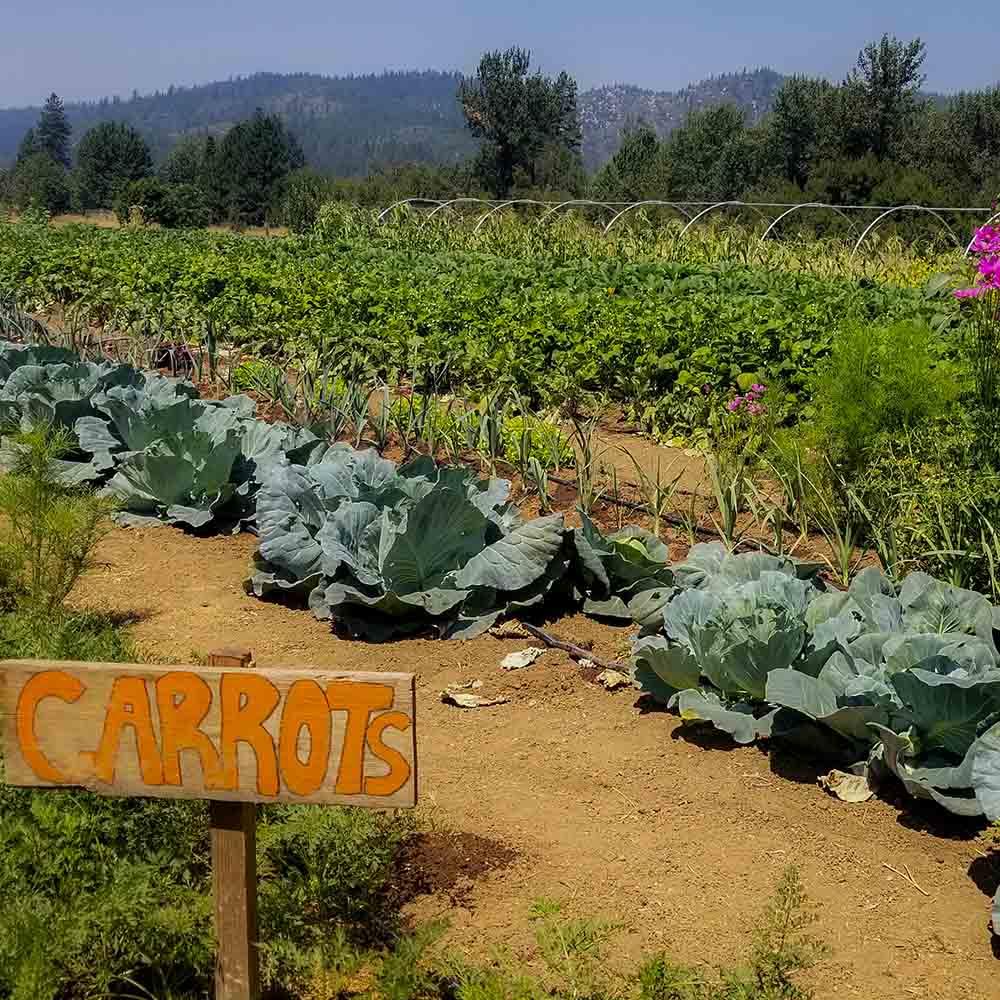

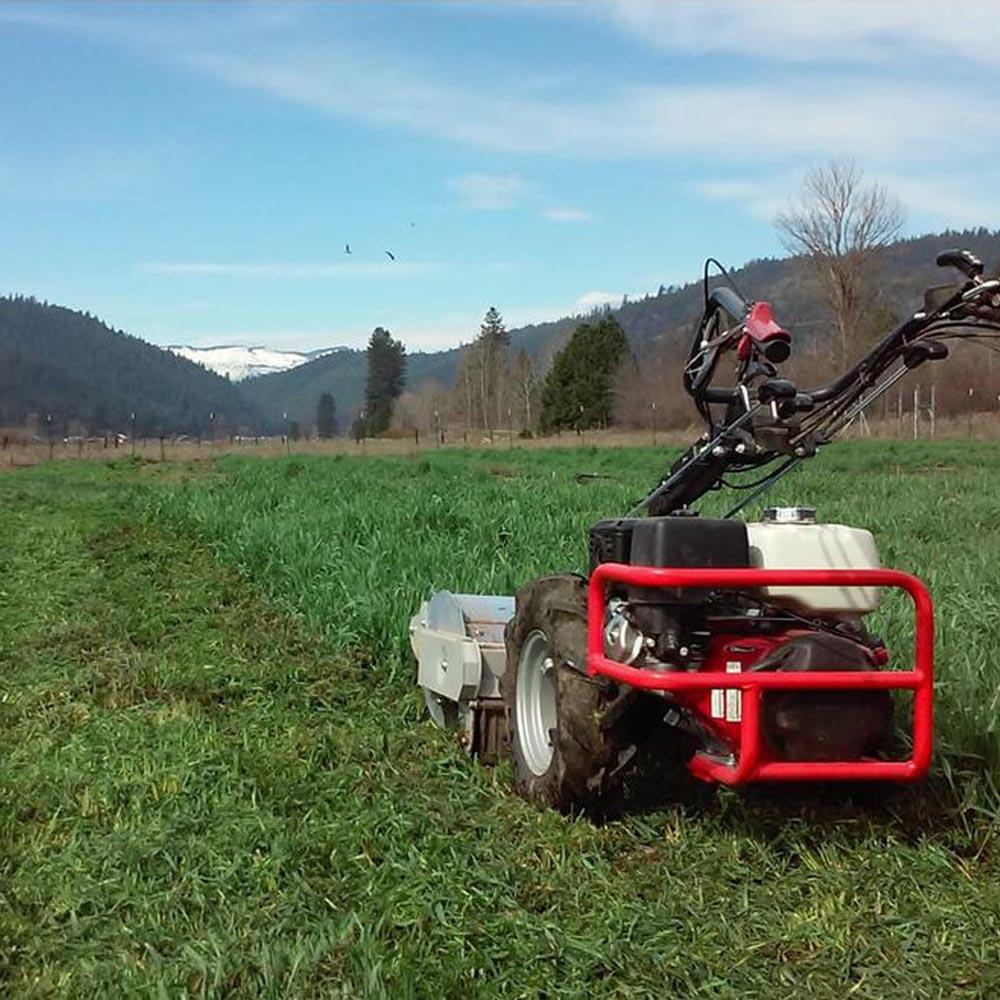

Why Choose #EcoFarmFRC?
We believe in the power of food. We believe in local. That’s why our curriculum teaches students the skills needed to farm and garden for themselves and others—the privileged and less-than-privileged—in a supportive learning environment designed to build community. Because everyone deserves healthy food.
As one of the few rural community colleges in California, Feather River College is an ideal setting for growing a new generation of leaders of the food movement. Our students will re-envision a food system that values everyone from the farmer to the consumer, respects our planet, and nurtures the connections between people and their food.
Plumas County’s mild mountain climate offers the ideal setting to learn high-altitude growing practices suitable for market growers. Skilled local farmers and strong community support provide a real-world learning laboratory to explore the positive economic, social, and environmental benefits of farming.
About the Certificate
Through the seasons, our local farmers have gained plenty of insights into how to grow delicious, nutritious food at a small scale in a less-than-optimal climate. That’s why we worked closely with them to design our curriculum, which has a focus on learning skills for growing in tough climates. Given our mountain environment, season extension is key!
Courses will take place on the FRC campus and at Rugged Roots Farm—the field site for course work and labs. Rugged Roots Farm is a diversified, small farm located just across Spanish Creek from FRC. The farm features vegetables appropriate for our climate, berries, herbs, and culinary and decorative flowers. Collaboration with Rugged Roots, which is part of the non-profit Lost Sierra Food Project, will provide practical experience in the operation and marketing of small local farm. A community of local farmers are committed to support you through the learning process as guest instructors, internship hosts, farm tour and activity hosts.
Outcomes
Upon completion of the certificate, students will:
- Demonstrate application of sustainable agriculture production techniques specific to high altitude crop production.
- Understand the complexities of managing a small farm, including product and market development, and appropriate technologies.
- Increase understanding of the food system and how small farms can be used as a tool for positive social, economic, and environmental change.
The following topics will be covered throughout the certificate:
- Soil & Fertility Management
- Vegetable Production
- Solanaceae (Tomatoes, Peppers, Eggplant, Potatoes)
- Cucurbits (cucumbers, summer squash, winter squash)
- Brassicas (broccoli, cabbage, cauliflower, Brussels sprouts, kale, Asian Greens, etc)
- Roots (beets, carrots, radishes, rutabaga, turnips)
- Salad Crops (head lettuces, mixes, arugula, salanova)
- Sweet Corn and Green Beans
- Herbs
- Season Extension Techniques (hoophouses, high and low tunnels, greenhouses, row covers, mulches, shade cloth, etc.)
- Irrigation
- Cover Cropping
- Tree Fruit & Berries
- Food Preservation (canning, fermenting, drying, pickling - even tinctures & salves!)
- Flower Production
- Crop Planning & Scheduling
- Organic Certification
- Harvest & Post Harvest Handling and Food Safety
- Transplant Production
- Passive Solar Greenhouse Management and Production
- Direct and Wholesale Marketing
- Business & Farm Planning
- Tool & Equipment Usage and Maintenance
- Plant Biology for Farmers
- Organic Weed, Pest, and Disease Management
The Ecological Farming Certificate will prepare students for a variety of job opportunities, including:
- Garden or Farm Manager
- School Garden Educator
- Produce Department Manager/Buyer
- Farmer’s Market Manager
- Produce Sales and Marketing
- Food Handling, Packaging, and Shipping
- Compost Production and Sales
- Organic/Sustainable Retail and Support Services (fertilizers, seeds, equipment)
- Chef/Restaurateur
- Sustainable Landscape Design
- Market Gardener or Farmer (Urban or Rural)
- Organic and Sustainable Certification Services, Organic Inspector
- Sustainable Agriculture Consultant
- Extension Agent or Farm Advisor
- Pest Control Advisor
- Distribution Chain Manager
- Agriculture and Natural Resources Communications
- Nursery Sales/Garden Center
Jessie Mazar
 Jessie is a lead instructor and works on program development for the Eco Farm Certificate. She instructs the high altitude crop production (late season), introduction to food systems, and pest management courses.
Jessie is a lead instructor and works on program development for the Eco Farm Certificate. She instructs the high altitude crop production (late season), introduction to food systems, and pest management courses.
Jessie has a background in regenerative agriculture, community food initiatives, and teaching in the food system with a concentration in experiential learning. She’s taught undergraduate students in a program called Rethinking Food Security: Agriculture, People, and Politic in Tanzania, India, India, Italy, Ecuador, and Malawi. She is currently Co-Director of the local non-profit Lost Sierra Food Project, which focuses on food access and ecological farm education.
In 2016 Jessie received an M.S. in Food Systems at the University of Vermont, where her research focused on a community food access project with farmworkers in the state. Jessie is skilled at growing food within a limited growing season after eight seasons in the Northeast. She coordinated and taught at a permaculture project where she worked with a team to keep beehives, learn about medicinal plants, establish an educational garden, put up a hoop house, and build an outdoor classroom, kitchen, and pizza oven. Jessie has also worked on farm-to-school education initiatives, where she built school gardens, ran after-school programs, and taught summer classes.
What do students say about Jessie? She is "a walking encyclopedia of eco-sustainable farming wisdom, especially at high altitude!" "Jessie is a dynamic, energetic, kind, knowledgeable, engaging, personal, fun, helpful, caring, involved instructor." Jessie represents "all the best qualities we're looking for in our garden...diversity, adaptability, resilience, beauty."
Bethany Rouse
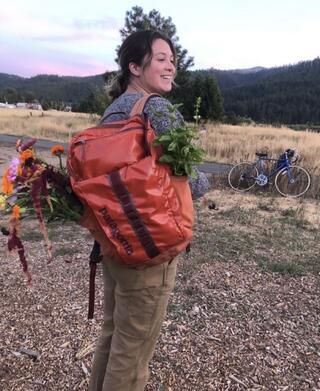 Beth started teaching courses for the Ecological Farming Certificate in the Environmental Studies program in 2023. She first started working with FRC in 2019 teaching community courses on basic rock climbing skills for the Outdoor Recreation and Leadership program. Beth received a B.S. in Environmental Science and Management in 2019 and has been farming and gardening at a variety of locations since she was a child. Previously, she worked at the Plumas County Fire Safe Council as the Outreach Coordinator for forestry and fire-related community programs. In conjunction with teaching at FRC, Beth is a Watershed Restoration Project Manager for Plumas Corporation. Outside of work, Beth can be found taking her dog on walks, painting, and whistling.
Beth started teaching courses for the Ecological Farming Certificate in the Environmental Studies program in 2023. She first started working with FRC in 2019 teaching community courses on basic rock climbing skills for the Outdoor Recreation and Leadership program. Beth received a B.S. in Environmental Science and Management in 2019 and has been farming and gardening at a variety of locations since she was a child. Previously, she worked at the Plumas County Fire Safe Council as the Outreach Coordinator for forestry and fire-related community programs. In conjunction with teaching at FRC, Beth is a Watershed Restoration Project Manager for Plumas Corporation. Outside of work, Beth can be found taking her dog on walks, painting, and whistling.
Michelle Fulton
Michelle Fulton has taught Biology, Botany, Forestry and Environmental Studies courses for the last 20 years at a variety of colleges. Her graduate research was focused on pollination biology. She recently retired from teaching to be able to spend more time on her small farm in Meadow Valley and to help manage the Feather River Food Cooperative. Michelle is a passionate supporter of sustainable food systems and regenerative farming systems. She has spent many years building her small farm, Fulhat Farm, into a viable organic dairy goat, chicken and honey bee operation. She gladly comes out of retirement to share her passion for farming and sustainable food systems with the EcoFarming program at Feather River College.
When not working on the farm or at the CoOp Michelle enjoys hiking, biking, skiing, surfing and following the spring bloom.
- Environmental Studies Home
- Ecosystem Restoration & Applied Fire Management Bachelor's Degree
- Degrees and Certificates
- Paid Work Experience
- Job Board
- Meet the Faculty and Staff
- Forest Health & Fuels Management
- Fish Hatchery
- Eco Farming Program
- Quick Reference Fact Sheet
- Social Media and Photos
- Recruitment Adventure Days (RAD!)
- Commercial Driver Preparation
- Blog
- Frequently Asked Questions
This site provides information using PDF, visit this link to download the Adobe Acrobat Reader DC software.

